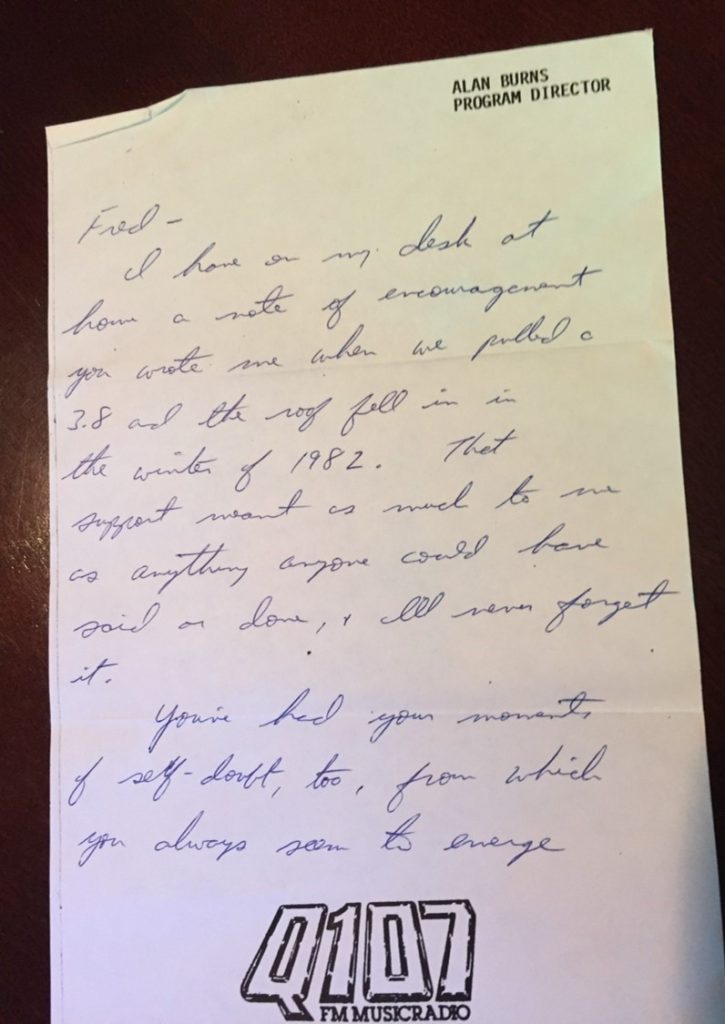
It started out as a Facebook post from Lori Lewis, a true “letting your hair down moment” about the vulnerabilities of being a PD. And from there, All Access columnist Perry Michael Simon picked up the ball and wrote a great column about the trials and tribulations of programming a radio station. It was aptly titled, “Darkness Before The Dawn.” Everyone who has ever sat behind the PD desk – from Kevin Weatherly to Scott Shannon to Rick Cummings – could relate to Lori and Perry’s thoughts.
So I hope neither of them will think I’m piling on with today’s blog post, but it hit home for me because I actually spent time over the Memorial Day Weekend cleaning out old files and boxes from the “good old radio days.”
And I came across this note from Alan Burns. We were each programming ABC-Owned radio stations back then; him at Q107 in D.C., and me here at WRIF in Detroit. I was experiencing one of those ratings valleys, and began to question everything.
 Alan’s missive served as that morale booster that I sorely needed at that painful moment in time. As you can see when you read this partial note, I had sent him a similar note the year before when he was not feeling great about his situation. Yes, every PD needs to know they’re OK, that their ratings aren’t a reflection of who they are as people, and that better days are ahead. The fact I’ve saved this note from more than 30 years ago tells you how meaningful it was to receive it at that low point.
Alan’s missive served as that morale booster that I sorely needed at that painful moment in time. As you can see when you read this partial note, I had sent him a similar note the year before when he was not feeling great about his situation. Yes, every PD needs to know they’re OK, that their ratings aren’t a reflection of who they are as people, and that better days are ahead. The fact I’ve saved this note from more than 30 years ago tells you how meaningful it was to receive it at that low point.
Like many of you, I wore my ratings around like Hester Prynne in A Scarlet Letter. I read that book by Nathaniel Hawthorne in the 8th grade, and while it is a story about owning your mistakes, it is also a tale about personal growth, and the understanding of others. In this case, a fellow program director who knew just what I needed during a very dark time.
So I thought I’d take a moment over the long weekend to write a note to all of you who are piloting your own starships, trying to navigate the roiling waters of change, and coping with the ramifications of your next ratings book.
Here’s a letter to anyone and everyone who is programming a radio station, who might just be looking for a word or two of encouragement, or just a little empathy. You can tack it up above your desk, put it in your top drawer, and at least know there’s encouragement from people like me, Perry, and Lori. Not all programmers are lucky or fortunate enough to get that PD pat on the back that is so needed in tough times, so here’s yours:
Dear Program Director,
Being the brand manager of a radio station has never been an easy task, but it’s become so much more challenging in recent years. Disruption, diminishing resources, and the financial pressures are very real factors. If you’ve never programmed a radio station, you just don’t know what it’s like.
And the ratings…well, they’re the ratings. They have never been an exact reflection of how you’re doing, complicated now by digital delivery and the inability for any methodology to keep up with consumers.
So, here’s some advice from someone who’s not only been there before, but has worked aside hundreds of PDs over the past 30-something years.
- You are not your ratings. So don’t get too high when they’re great, or too low when they’re not. You’re better than this, and be assured that it all moves in cycles.
- It takes time to get good at this. Malcolm Gladwell suggests that mastering any skill requires 10,000 hours of work. By my calculations, that’s four years of programming.
- The best support group is other PDs. Like the notes that Alan Burns and I sent to one another, an empathetic programmer who is or has been in your boat is often just what you need.
- Reach out for help. No one is good at everything. If you’re a star at creating events, but not so great at music scheduling, hire to your weaknesses or ask for aid from the outside.
- Your staff is counting on you. Whether it’s one other person or a team of 20, they look up to you for guidance, direction, and confidence. Chances are, most of them are more insecure than you are.
- If you’re in a no-win situation, reassess. Even the greats aren’t going to program their way out of a Mission Impossible mess. If the conditions are such that there’s no way you can win, there is no shame in moving to a Plan B.
- Be honest to your boss, your company, and yourself. That old Shakespearian quote, “To thine own self, be true,” applies to every programmer, whether in New York City or Nome.
- You can do this. Someone with money and/or brains decided you’re the one to lead this station. They trusted you to make it happen. Storm troopers will not come to your front door, accuse you of not being worthy, and cart you off. Get back on the horse and do what you do well.
Sincerely,
Fred
- What To Do If Your Radio Station Goes Through A Midlife Crisis - April 25, 2025
- A 2020 Lesson?It Could All Be Gone In A Flash - April 24, 2025
- How AI Can Give Radio Personalities More…PERSONALITY - April 23, 2025




My first PD job was in a large market, but a small rimshot in a unique format. (I was the PD of the first “all 80’s station”. I had been an APD on again/off again for about 15 years and pretty much knew the drill. I told the staff the day before the format change that we were doing something no one had ever done. That we were “inventing” a format. That we would make mistakes. That we’d have good and not so good books until we got the format figured out. All of which turned out to be true. We went on a ratings slide about two years in, and some, not all…of the people inside the station turned on me. I wasn’t ready for that emotional low, or the internal battles it brought. But, I stuck to programming basics, and eventually did research and figured out the problem was the direction of the station dictated by a consultant. Financial issues forced the consultant out, and I was given a chance to bring things back around. Sticking to the basics worked. We turned it around. And my reward was a new job with a bigger station. Few jocks who never become PD’s have any appreciation at all for how “the boss” feels when the ratings aren’t up to expectations. We have to cheer them up, while we go home miserable.
Every PD has quietly gone off to throw up somewhere after assuring the staff we’re on the right track and we’ll eventually succeed. It’s just part of the gig. And I hope, Kevin, I wasn’t “that consultant.” Thanks for chiming in.
So true. Thank you Fred!
My pleasure, Matt.
Thanks, Fred!
My pleasure, Chuck.
Great read, Fred. I wish I could have read it when I started programming.
Not that I think of it, me too! Thanks much, Jim.
This was a great post. PDs face a very imperfect form of measurement, increasingly more things that they’re responsible for, (websites/apps/streams, blogs/podcasts, etc.) and fewer and fewer tools to help them get the ratings that everyone wants and expects. And I’m told – no personal anecdotes I can recall though 🙂 that GMs can be especially ruthless after a bad book. They have a tough and getting tougher job and I’m sure for them it can be difficult to locate the high ground.
Good luck to all PDs!!!
From a former GM, great comments. Thanks, Bob.
Bravo, Fred. Bravo. Thank you.
Appreciate it, Keith.
Fred: You nailed it, as you so often do.
Don, high praise from a guy who’s spent many years in the trenches. Thank you.
What a great and inspiring article…thanks, I needed that!
Appreciate it, Mike.